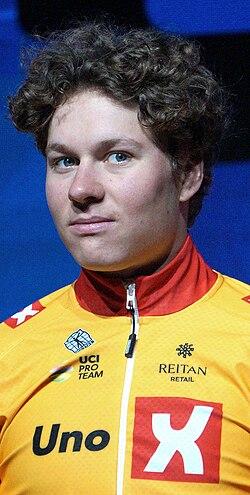In a remarkable display of resilience and determination, Norwegian cyclist Jonas Abrahamsen surged to victory in Stage 11 of the Tour de France, just four weeks after suffering a severe collarbone fracture. The 28-year-old rider’s triumph not only underscores his exceptional skill on the bike, but also serves as an inspiring testament to his indomitable spirit and rigorous recovery process. As the grueling race winds through its challenging routes, Abrahamsen’s unexpected comeback has reignited the excitement among fans and fellow competitors alike. His victory raises questions about the limits of athletic endurance and recovery, marking a pivotal moment in this year’s Tour de France.
Jonas Abrahamsen’s Triumph: Overcoming Adversity in the Tour de France
In a stunning display of resilience and determination, Jonas Abrahamsen clinched the top spot on Stage 11 of the Tour de France, merely four weeks after sustaining a fractured collarbone. The 28-year-old cyclist’s triumph is a testament to his unwavering commitment and rigorous rehabilitation. Abrahamsen’s performance was nothing short of spectacular, as he skillfully navigated the mountainous terrain of the French Alps, leaving seasoned competitors in his wake. His ability to adapt and surge ahead after such a debilitating injury has captivated fans and sports analysts alike.
This remarkable victory was marked by several key factors that contributed to Abrahamsen’s success:
- Strategic Planning: Abrahamsen and his team meticulously charted a course that maximized his strengths.
- Physical Training: A tailored fitness regimen allowed him to regain his strength and endurance before the race.
- Mental Resilience: Overcoming personal doubts played a crucial role in his victorious comeback.
As he crossed the finish line, jubilant supporters erupted in celebration, acknowledging not only his talent but also his extraordinary journey back to peak performance. In the light of such an inspiring comeback, Abrahamsen has become a symbol of hope for athletes facing adversity.
A Closer Look at Abrahamsen’s Recovery Journey and Mental Resilience
Jonas Abrahamsen’s remarkable triumph in Stage 11 of the Tour de France is not just a testament to his cycling prowess but also a striking account of his mental resilience in the face of adversity. Just four weeks prior, the young athlete faced a daunting setback after suffering a fractured collarbone in a crash during stage training. This injury could have sidelined many competitors, yet Abrahamsen’s relentless spirit and determination propelled him back onto the bike, exemplifying the strength found in overcoming challenges. His journey back to competitive form serves as an inspiring narrative for athletes and fans alike, showcasing the power of a positive mindset and unwavering dedication.
The rehabilitation process is never easy, but Abrahamsen implemented key strategies to facilitate his recovery, which can serve as valuable lessons for those facing similar hurdles. His approach included:
- Setting realistic goals: Abrahamsen focused on gradual milestones rather than rushing his recovery.
- Maintaining a supportive network: Leaning on teammates, coaches, and family provided him with essential encouragement.
- Mental conditioning: Visualization techniques kept his mind engaged and motivated throughout the healing process.
- Incremental training: He gradually increased his training intensity, carefully listening to his body to avoid re-injury.
Ultimately, Abrahamsen’s victory was not merely about the physical feat of racing; it was an embodiment of resilience, proving that with the right mindset, even the toughest obstacles can lead to momentous achievements.
Key Strategies for Athletes Facing Injury: Lessons from Abrahamsen’s Victory
Jonas Abrahamsen’s remarkable comeback just weeks after a collarbone fracture not only showcased his incredible talent but also illuminated vital strategies for athletes grappling with injury. Central to his success was a tailored rehabilitation program that emphasized gradual recovery while maintaining fitness. Abrahamsen’s training included a mix of low-impact exercises and mental conditioning, ensuring he stayed in peak performance condition despite the physical setback. Active recovery, rather than complete rest, enabled him to manage pain while preparing his body for the demands of competitive racing.
Furthermore, Abrahamsen benefited from a robust support system, featuring a dedicated team of coaches and medical staff who facilitated a seamless return to competition. Effective communication within this team allowed for adjustments in strategy that prioritized his health and performance. Athletes facing similar challenges can take note of the following key approaches:
- Personalized rehabilitation plans to cater to specific injuries.
- Incorporation of mental conditioning to bolster focus and confidence.
- Open lines of communication with coaches and medical professionals.
- Emphasis on gradual reintegration into competitive settings.
Concluding Remarks
In a remarkable display of resilience and determination, Jonas Abrahamsen has etched his name in Tour de France history with a stunning victory on Stage 11. Just four weeks after suffering a severe collarbone injury that threatened to end his campaign, Abrahamsen’s triumph serves as a testament to both his physical fortitude and mental tenacity. As the riders continue their grueling journey through the iconic French landscapes, the cycling world will undoubtedly keep a close eye on the young athlete, anticipating what he might accomplish next. With this stage win, Abrahamsen not only reclaims his position among the elite cyclists of the peloton but also inspires countless fans with his comeback story. As the race unfolds, one thing is clear: Jonas Abrahamsen has firmly established himself as a formidable contender in this year’s Tour de France.











